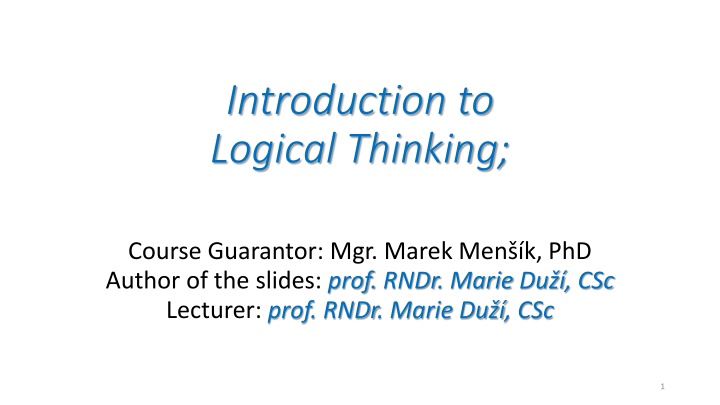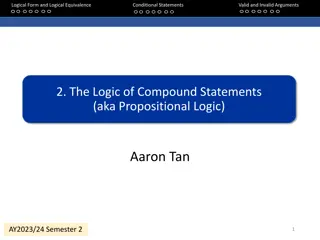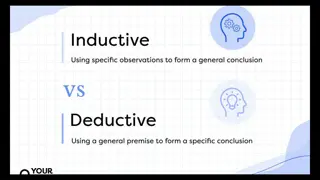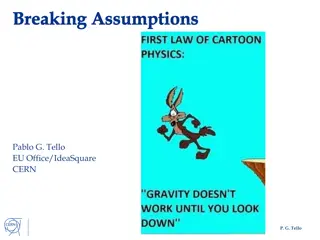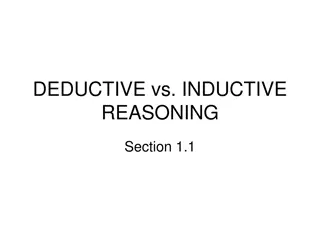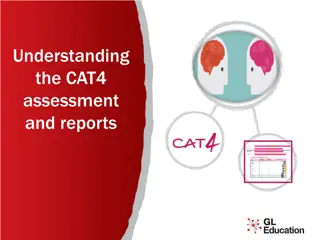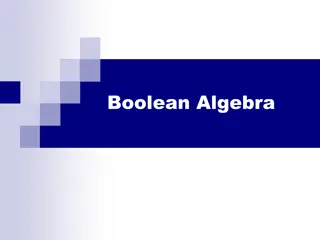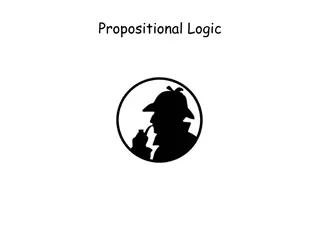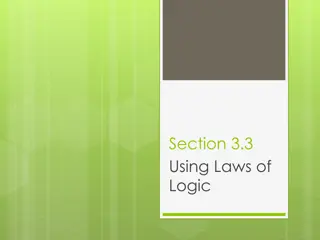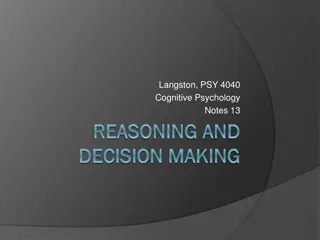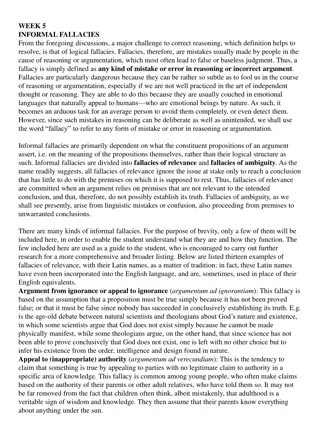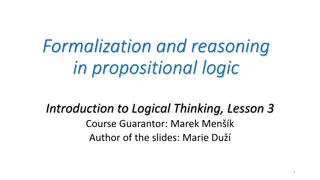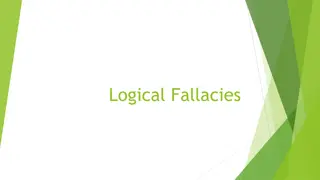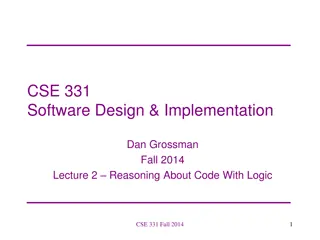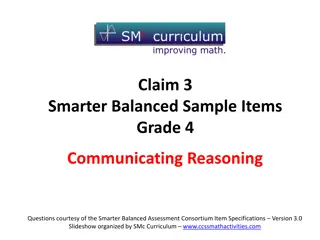Introduction to Logical Thinking: Science of Correct Reasoning
Logic, the science of correct reasoning, explores ways to infer conclusions from assumptions and validate arguments. This course introduces logic as a tool for analyzing arguments, automating processes, and enhancing communication clarity. Through classic logic variants like propositional and predicate logic, learn how logic enhances reasoning abilities and fosters precise expression. Dive into logical systems applied in various fields, cultivating a joy for logical thinking.
Download Presentation

Please find below an Image/Link to download the presentation.
The content on the website is provided AS IS for your information and personal use only. It may not be sold, licensed, or shared on other websites without obtaining consent from the author.If you encounter any issues during the download, it is possible that the publisher has removed the file from their server.
You are allowed to download the files provided on this website for personal or commercial use, subject to the condition that they are used lawfully. All files are the property of their respective owners.
The content on the website is provided AS IS for your information and personal use only. It may not be sold, licensed, or shared on other websites without obtaining consent from the author.
E N D
Presentation Transcript
Introduction to Logical Thinking; Course Guarantor: Mgr. Marek Men k, PhD Author of the slides: prof. RNDr. Marie Du , CSc Lecturer: prof. RNDr. Marie Du , CSc 1
Additional Materials to study Du , M.: https://www.cs.vsb.cz/duzi/ILT.html http://www.cs.vsb.cz/duzi/Matlogika.pdf Gensler, H. J. (2010): Introduction to Logic (2nded.). London, New York: Routlege. Devlin, K.: Introduction to Mathematical Thinking, K. Devlin 2012, ISBN: 978-0615653631 Huth, M.: Logic in Computer Science: Modelling and Reasoning about Systems, Cambridge 2008, ISBN: 978-0521670890 2
The subject of logic. What is logic about? Logic can be characterized as the science of correct reasoning, the art of valid argumentation. Logic investigates ways of inferring conclusion from given assumptions and proving validity of such an inference. When doing logic, we want to separate correct or valid ways of argumentation from those that are invalid. The assumptions and derived conclusion can concern many different areas. We can argue in favour of the existence of God, free will, or determinism. The defence lawyer argues in favour of the person charged while the prosecutor against the accused, etc. 3
The subject of logic. What is logic about? In this course, logic will not be an irrelevant game playing with peculiar symbols. The goal of this course is to introduce logic as a useful tool for the analysis and evaluation of arguments, and the proof of their validity. We will also deal with the way how to automatize these analyses and proofs(how to teach machines thinking for us ). In natural language, there are many ambiguous or vague formulations. Hence, we will also deal with the problem of a fine-grained rigorous analysis of language terms meaning. To this end, we will introduce some unambiguous formal languages with rigorously specified semantics, which is a necessary assumption for further automatization. 4
The subject of logic. What is logic about? Logic has been applied in many areas: We have logic for computer science , logic for lawyers (deontic logic), logic of question answering (erotetic logic), logic of knowledge and beliefs (epistemic and doxastic logic), etc. There are many different logical systems; they are classic or non-classic, mathematical or philosophic logics. In this course, we will deal only with classic logic in its two simple variants, namely propositional and 1st-order predicate logic. Why to study logic? Logic cultivates our reasoning and expressing ideas in a precise way; it makes our mutual communication easier; it also makes it possible to automatize valid ways of reasoning in a computer accessible way. Last but not least, it is good to study logic because logic is a joy. 5
Deductively valid arguments; test If I oversleep, I ll be late. I wasn t late. If I oversleep, I ll be late. I did not oversleep. From these premises it follows that (mark the correct answer): a) I overslept a) I was late b) I did not oversleep b) I was not late c) I was late c) I overslept d) Nothing of the above d) Nothing of the above (b) (d) 6
Deductively valid arguments Consider three similar sentences: a) Some accountants issue invoices b) All accountants issue invoices c) Only accountants issue invoices Assume that d) Tom is an accountant In which case can we validly infer that Tom issues invoices? Assumption (a) does not suffice, of course. Hence, consider two variants of an argument: 7
Deductively valid arguments All accountants issue invoices Tom is an accountant Tom issues invoices U1 The first assumption expresses the fact that being an accountant is a sufficient condition for issuing invoices (but invoices can be issued also by other people, not only by accountants, of course). Hence, the argument U1is valid. 8
Deductively valid arguments Only accountants issue invoices Tom is an accountant Tom issues invoices Does the first assumption together with the second one suffice to validly infer that Tom issues invoices? In other words, is U2 valid? According to the first assumption, being an accountant is a necessary condition for issuing invoices. In other words, U2 If somebody issues invoices then he/she is an accountant There is nobody who would issue invoices and were not an accountant Hence, invoices can be issued only by accountants, which does not mean that all the accountants issue invoices. Some of them can be involved in other financial operations. The argument U2is not valid. 9
Deductively valid arguments Let us adjust the argument U2so as it be valid: Only accountants issue invoices Tom is not an accountant Tom does not issue invoices U3 Certainly, according to the first premise being an accountant is a necessary condition for issuing invoices and Tom (according to the second premise) does not satisfy it; hence, Tom cannot issue invoices. The argument is valid 10
Deductively valid arguments (important schemas) valid valid If A, then B. not B not A if A, then B. A B invalid invalid If A, then B. B A If A, then B. not A not B 11
Deductively valid arguments (important schemas) valid valid All Ps are Qs. a is not aQ. a is not aP. All Ps are Qs. a is a P. a is a Q. invalid Only Ps are Qs. a is a P. a is a Q. valid Only Ps are Qs. a is not aP. a is not aQ. 12
Deductively valid arguments (examples) On the door of the lift, there is a notice: Only employees use the lift! Moreover, we know that Marie sometimes uses the lift. Hence, we logically deduce that Marie is an employee. For, if Marie were not an employee and yet used the lift, it could not be true that only employees use the lift. Hence, the assumption of premises being true and conclusion being false yields an inconsistency. In other words, it cannot be the case that the premises were true and conclusion false. 13
Deductively valid arguments (examples) On the other hand, if we only know that Marie is an employee, then (on the assumption that only employees use the lift) we cannot validly deduce that Marie uses the lift. Hence, from the premises Only employees use the lift. Marie is an employee. It does not logically follow that Marie uses the lift because the truth of the premises does not contradict falseness of the conclusion. 14
Example; more premises, and a little bit more complicated premises Only those who are at least 18 years of age have the right to vote. In the Smith family, there is nobody who wouldn t have the right to vote. Jack is the youngest member of the Smith family. Jack is at least 18 years old. Note that applying laws like those concerning suffrage calls for logical thinking. Hence, laywers should be educated in logic. This argument is valid. Jack, as a member of the Smith family (the third premise) has the right to vote (second premise). Hence, according to the first premise, Jack must be at least 18 years of age. 15
Definition of a valid argument Notation for a valid argument: P1, , Pn|= C Propositions P1, , Pnfrom which we derive the conclusion C are called premises. Definition (deductively valid argument) The argument P1, , Pn|= C is deductively valid, if and only if it is not possible that all the premises P1, , Pnwere true and the conclusion C false. We also say that the conclusion C logically follows from (is entailed by) the premises P1, , Pn Equivalent definition The argument P1, , Pn|= C is deductively valid, if and only if the assumption of premises being true and the conclusion false yields a contradiction. 16
Definition of a valid argument; comments Pay attention! If we prove that the argument P1, , Pn |= C is valid, we have not proved that the conclusion C is true. It is true only if the premises are true. Yet, in such a case, at least one of the premises must be false. Hence, a valid argument can have a false conclusion Death cap is one of the most poisonous mushrooms. This apple is a death cap. This apple is poisonous. Since the conclusion is obviously false, at least one of the premises must be false as well. It is the second one, of course. Mind that the truth of particular propositions and validity of an argument are different notions. While the truth value of a proposition is often a casual matter that is discovered by an empirical investigation of the state of affairs, validity of an argument is a necessary relation between premises and conclusion. Hence, validity of an argument is an analytical issue. Logic is an analytic discipline. 17
Definition of a valid argument; comments Unpleasant corollary: Inconsistent premises entail any conclusion. Imagine that the premises P1, , Pn are inconsistent; it means that it can never be the case that all of them are true. Hence, the contradiction is already in the premises. But then, according to the definition, any conclusion is entailed! Sure, if it is not possible that all the premises P1, , Pn were true, then any conclusion C plus the premises are contradictory. Hence, such an argument is valid. 18
Definition of a valid argument; comments Artificial inteligence is a discipline that deals with automated reasoning. It is often characterized as a struggle for consistency. Imagine that there is a large knowledge base obtained by data collection. Since such a data collection can easily become inconsistent by a mistake, the inference machine would collapse whenever the inconsistency sneaks into the data. Hence, in this discipline, a lot of efforts is made to deal with this problem. Methods of knowledge or rather belief revision have been developed. Or, we aim at localizing the inconsistency to avoid deducing anything, and take into account only those parts of the knowledge base that should be consistent. These methods are a subject matter of the so-called paraconsistent logic. However, in this course, we deal only with classic logic. 19
Analytically true proposition vs. contradiction If the number of premises equals zero, we deal with a valid argument without premises: |= C It means that falseness of the conclusion C, i.e. C, is a contradiction. Symbolically, C |= (from negated C anything follows, as C cannot be true.) In other words, if |= C, then C cannot be false; we say that C is an analytically or logically true proposition. Example. No bachelor is married is analytically true. If one understands the terms bachelor and married , then one knows that the proposition is necessarily true. Hence, you wouldn t empirically examine particular bachelors and ask them about their being married. Rather, you d apply logic. |= C if and only if C |= 20
Valid argument and analytically true proposition Semantic theorem of deduction The argument P1, , Pn|= C is valid iff the proposition of the form If (P1 and and Pn), then C is analytically true. Schematically: P1, , Pn|= C iff |= (P1& & Pn) C Premises can be moved to the right-hand side as the antecedents of an implicative proposition: P1, ..., Pn|= C P1, ..., Pn-1|= Pn C P1, ..., Pn-2|= (Pn-1& Pn) C P1, ..., Pn-3|= (Pn-2& Pn-1& Pn) C |= (P1& & Pn) C (iff) 21
Valid arguments in mathematics Deductive entailment is a necessary relation between premises and conclusion. It holds analytically or logically necessarily. The question whether premises happen to be true is not a logical matter. It is a matter of empirical investigation of the state of affairs. Logic is analytic science. Mathematical sentences are true or false independently of the state of affairs. Yet, checking their truth value can often be very demanding. However, if we find out that premises are true (for instance by consulting a mathematical text book or Stanford encyclopedia), we can rely on logic and derive other sentences that are entailed by these assumptions, and we know that they are true as well. 22
Valid arguments in mathematics Example. Natural number is divisible by 3 iff the sum of its digits is divisible by 3. The sum of the digits of the number 5556 is 21. The number 21 is divisible by 3. The number 5556 is divisible by 3. Hence, if by studying mathematics we get to know that the premises are true, we can rely on logic in order to know that the number 5556 is divisible by three. There is no need to compute it any more. 23
Sound argument vs. argumentation ad absurdum Valid argument with true premises is called sound. A sound argument has the conclusion true as well. If a valid argument has a false conclusion, then at least one of the premises must be false; the argument is not sound. Thus, there is a question, what is a valid argument that is not sound good for? The answer is this; it is used as an indirect proof, argument ad absurdum. 24
Non-sound arguments Example: a) Invalid argument (conclusion is not entailed by the premises): All billionaires donate charity. John donates charity. John is a billionere. b) Valid argument but not sound: Death cap is one of the most poisonous mushrooms. This apple is a death cap. This apple is poisonous. Valid, non-sound argument can be used as an argument ad absurdum, i.e. indirect proof. If you want to argue against the proposition that this apple is a death cap, you prove that in such a case it must be poisonous. Since it is not poisonous, it cannot be a death cap. 25
Non-sound arguments For instance, if somebody claims that all the politicians are corrupted, but you believe that this is a bit exaggerated and thus don t agree, you might argue against it like this. Well, but Mr XY is a politician and he is not corrupted! Such an argumentation in favour of falseness of some proposition is argumentation ad absurdum, or an indirect proof. We show that when assuming true C, obvious falseness is entailed, or that assuming C yields a contradiction. Example (Harry J. Gensler 2010): In the Autumn of 2008, Barack Obama before his being elected to the office of US president, seemed to be a leading nominee of the majority of voters in public opinion surveys. But many believed he eventually wouldn t win due to the so-called Bradley effect . It consists in the fact that white voters say they would vote for a black nominee, yet eventually they don t. 26
Non-sound argument; example In the CNN interview on October 8th, 2008, lead by Larry King with the wife of Barack Obama, Michelle argued against the alleged statement that Obama will not be elected due to Bradley effect. She applied this argument. Barack Obama is the Democratic nominee. If there was going to be a Bradley effect, Barack wouldn t be the nominee [because the effect would have shown up in the primary elections]. [Hence,] there isn t going to be a Bradley effect. After this statement Obama s opponents couldn t simply claim that there is going to be Bradley effect. Since the first premise was true, they d have to raise doubts against the second premise. They d have to claim that though Bradley effect did not show up in the primary elections, it will show up in the final round. Yet, this opinion could hardly be defended. Indeed, on January 20, 2009, hundreds of thousands turned out in Washington, D.C., to witness Obama taking the oath of office as president. 27
Other ways of reasoning; deriving consequences Other ways of reasoning; deriving consequences from premises by from premises by induction and abduction induction and abduction In this course, we deal only with deductive reasoning that is truth-preserving. Recall; an argument is deductively valid iff necessarily holds this: if all the premises are true then the conclusion is true as well. In other words, the truth of premises and falseness of the conclusion is a contradiction. In our everyday practice, other ways of reasoning (other ductions ) are used as well. They are those ductions where the relation between premises and conclusion is not so strictly, necessarily truth-preserving. They are, in particular, induction and abduction. Comment: In this course, we are going to deal only with deduction. Induction and abduction are under scrutiny in other disciplines, such as artificial intelligence. 28
induction and abduction induction and abduction vs. vs. deduction deduction Valid deduction. All citizens of the Czech Republic live in Europe. Petr is a citizen of the Czech Republic. Petr lives in Europe. Inductive reasoning: The citizens of the Czech Republic mostly speak Czech. Petr is a citizen of the Czech Republic. Petr speaks Czech. (most probably) In this argument the truth of premises does not guarantee the truth of the conclusion. For instance, Petr could have moved to the CR from Bratislava, obtained the citizenship, but he speaks only Slovak. Or, he might have been an immigrant who found here political asylum, obtained citizenship, yet still did not learn Czech properly. 29
induction induction and abduction and abduction vs. vs. deduction deduction Abductive reasoning: Petr speaks Czech. Czech language is spoken in the Czech republic Petr lives in the Czech Republic. (most probably) Abductive reasoning can be characterized as seeking the causes, facts that would explain observed symptoms. If you meet somebody who speaks Czech, you d believe that this person is from the Czech Republic. Yet, you can t be sure, he/she could have emigrated or be an offspring of Czech emigrants who stayed all his life in Australia. Yet his parents took care of not forgetting the mother tongue. This kind of reasoning is applied, e.g., in medicine to indicate a diagnose based on the observed symptoms, or in industry when seeking the causes for malfunctioning device. It is actually a reasoning reversed to induction. We aim to find the assumptions from which it is possible to deduce or at least induce the observed facts, and thus to explain it. 30
